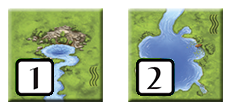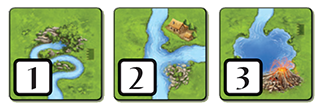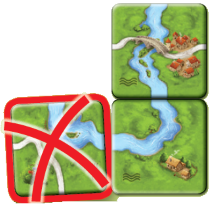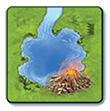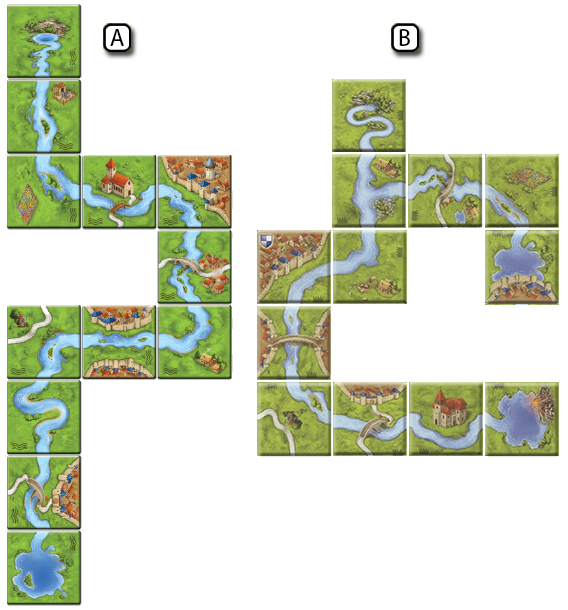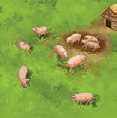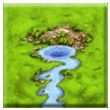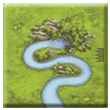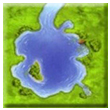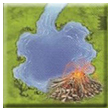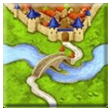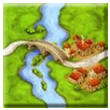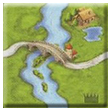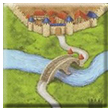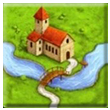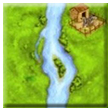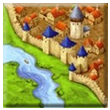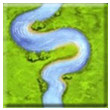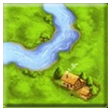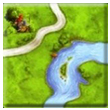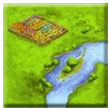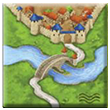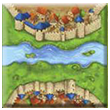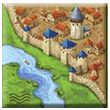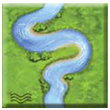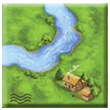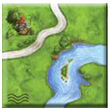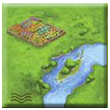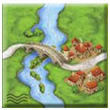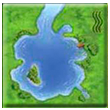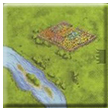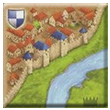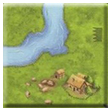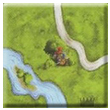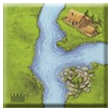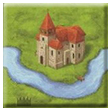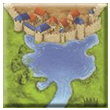River
For first edition rules follow here: River.
General info and comments
File:Count King And Robber C2 Expansion Watermark.png Expansion symbol for The River II |
The River was originally released for the New Edition by Hans im Glück in 2014. The 1st. Edition of River was release in 2001.
The River II was released for the New Edition by Hans im Glück in 2017 as part of Count, King and Robber. The River II was originally released for the 1st. Edition in 2005, and later bundled in the major expansion Count, King and Robber in 2008.
The river expansions modify the beginning of the game by having players place a set of specific river tiles before the normal tiles.
Copies of The River printed in the period 2014-2016 have the darker city backgrounds.
Contents
- The River: 12 river tiles, each with with a dark back and no symbol (original version) or a stream symbol (Big Box 6 version)
- The River II: 12 river tiles, each with with a dark back and a crown symbol
Rules
Preparation
The River and The River II replace the start tile. Select the river expansion you want and discard the other. Set aside the source and lake tiles. Shuffle the remaining river tiles and stack them facedown. Add the lake tile to the bottom of the stack, and place the source tile faceup as the starting tile.
Preparation of The River II
The river expansion added to Count, King and Robber includes a river fork tile. It should be set aside along with the source and lake tiles. The fork tile is to be placed first (after the source tile) by the first player.
Combining The River and The River II
You can combine The River with The River II from base game to make a very long river. Keep only one source and one lake.
Do not use both The River II and The Count of Carcassonne. Combining the two can lead to situations where the river cannot be completed.
Playing the game
1. Placing a tile
You must draw tiles from the River stack before drawing normal tiles. Place your river tile at the end of the river. As always, tiles must be placed so that their edges match the edges of tiles already in play. You cannot make a river turn twice in a row in the same direction (a U-turn), as this risks that the following tile will be impossible to place. Players must draw and place all river tiles before they can draw normal tiles.
When playing with The River II, you may have up to two river branches to choose from when creating the river. You cannot connect both river branches together.
![]() Question: With the U-turn rule when making rivers, does that mean no U-turn ever, or just no immediate U-turns because it will complicate the placement of subsequent river tiles?
Question: With the U-turn rule when making rivers, does that mean no U-turn ever, or just no immediate U-turns because it will complicate the placement of subsequent river tiles?
Answer: Only immediate U-turns are explicitly forbidden. Naturally, there can also be problems if a straight river tile lies between. Turning river the same way three times should also be considered prohibited.
2. Placing a meeple
Like any other tile, you may place a meeple on other features of a river tile you just placed. [1] Meeples cannot be placed on the river itself.
When playing with The River II, if you place the last river tile (the lake with the volcano), you cannot place a meeple on that tile. Immediately after placing it, [2] take another turn by drawing a normal tile.
3. Scoring
The river feature itself cannot be scored. All other features on river tiles are scored as usual.
The River II special features
The inn and the volcano on the river follow the rules from their expansions (Inns and Cathedrals and The Princess and the Dragon, respectively). The pig-herd [3] has the same effect as a pig in a field (from Traders and Builders). If you are playing without these expansions, simply ignore these features.
Clarifications for new landscape tiles
The following tiles do not split farms - there is one farm on each tile
Farms do not go under small bridges - there are 4 separate farms here
and three farms here, one north and two south.
While this big bridge does not separate farms. There are two farms here - one eastward and one westward.
The houses by this bridge do not end the road.
Other expansions
For the River II there are some clarifications when using it with other expansions:
- Exp. 1 - Inns and Cathedrals: One of the river tiles contains an inn that affects a road.
- Exp. 2 - Traders and Builders: The pig-herd increases the value of its field by 1 point per completed city. This bonus is in addition to the points given by the pig.
- Exp. 3 - The Princess and the Dragon: Immediately after placing the lake with volcano, place the dragon on it.
- Exp. 5 - Abbey & Mayor: The pig-herd only affects field scoring for farmers during the game (due to the barn) and after the game. Barns do not score additional points from the pig-herd after the game.
House rules
House rules for The River
- You are not permitted to lay down any meeples until the entire river is down. (Thanks to metoth)
- Once the river is complete, it may be moved to the center of the playing area. (Thanks to Joff)
- Instead of starting with the spring and setting aside the lake, put all of the river pieces into the bag. In this way the river can be any size and there is usually more then one option for placing a river tile. (Thanks to DavidP)
- Mix the original starting tile (without a river) in with the river tiles. If it is drawn then it acts like a 'bonus' tile that can be placed anywhere. (Thanks to RationalLemming)
- Lay the river in reverse order, from lake to spring. No real advantage, but might be more desirable, when playing the Count of Carcassonne expansion, to have the lake near the City of Carcassonne for purely aesthetic reasons. (Thanks to Scott)
House rules for The River II
- Play the fork of the river first, and lay the spring last. The lakes are mixed in with the other river tiles. (Thanks to Joff)
- Pig-herd tiles do not score a bonus. (Thanks to Joff)
- Play both rivers backwards starting with the city/lake. This is more realistic because you then get two springs producing rivers that join and flow ‘down’ to a lake. Discard two lakes—the plain one from River I and the volcano. To set up, place the lake tile, put one spring tile aside as a final ending tile, and then split the balance of the river tiles into two stacks. The junction tile is shuffled into stack 1 and the other spring into stack 2. Then the stack 1 is placed on stack 2—so that the junction will be drawn sometime before the spring. If playing with the Count of Carcassonne, place the city/lake so that it completes one of the small cities around Carcassonne. (Thanks to dwhitworth)
- Select only one lake tile and use two spring tiles. Lay the river in reverse order. The fork can be placed randomly, or at some predetermined point. The end result is two rivers flowing into one which then flows into a lake. (Thanks to Scott)
- Start from the fork, playing tiles on all three branches. Play the spring and lake tiles at the end, or mix two of the three with the rest of the river before play to have two of the three branches end randomly. (Thanks to Scott)
Tile distribution
The River
Total tiles: 12
Some of the tiles have a small illustration on them. The letters in brackets show which illustration is on each tile:
Additionally, some tiles present additional features indicated in bold (source, and lake).
The River I (Big Box 6 version)
Total tiles: 12
Some of the tiles have a small illustration on them. The letters in brackets show which illustration is on each tile:
Additionally, some tiles present additional features indicated in bold (source, and lake).
The River II
Total tiles: 12
Some of the tiles have a small illustration on them. The letters in brackets show which illustration is on each tile:
Moreover, some tiles present additional features indicated in bold, some proper of River II (source, fork, and lake), some others serving as tie-in with other expansions (inn, pig-herd, and volcano).
Footnotes
For Icons explanation and licensing please visit Icons page.
- ↑
 Note that river segments separate farms. (08/2014)
Note that river segments separate farms. (08/2014)
- ↑
 This is not standard procedure for placing a volcano tile, according to the rules for The Princess and the Dragon. Under those rules placing a volcano tile does not allow the player to draw a second tile; instead, the player may only perform actions not connected with meeple deployment.
This is not standard procedure for placing a volcano tile, according to the rules for The Princess and the Dragon. Under those rules placing a volcano tile does not allow the player to draw a second tile; instead, the player may only perform actions not connected with meeple deployment.
- ↑
 The English rules called this feature "pigsty." We use pig-herd for consistency with Carcassonne I and also in order to avoid the confusion with the pigsty feature introduced in Carcassonne II, scored by some expansions such as The Markets of Leipzig to The Tollkeepers.
The English rules called this feature "pigsty." We use pig-herd for consistency with Carcassonne I and also in order to avoid the confusion with the pigsty feature introduced in Carcassonne II, scored by some expansions such as The Markets of Leipzig to The Tollkeepers.
- Editor Manual - Old numbered parameters - FAQ
- Editor Manual - Old numbered parameters - RulesPlacingTile
- Editor Manual - Old numbered parameters - RulesPlacingMeeple
- Editor Manual - Old numbered parameters - RulesScoring
- Editor Manual - Old numbered parameters - Tile
- Old template
- Old template - FootnoteIconPara en
- Second Edition
- Second Edition Minor Expansion

